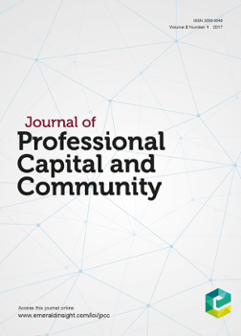Table of contents
Essential features of effective networks in education
Santiago Rincón-Gallardo, Michael FullanThe purpose of this paper is to advance clarity and precision around effective action in networks, understood as collaboration that: first, deepens the learning and engagement of…
School human capital and teacher salary policies
Eric A. HanushekThe purpose of this paper is to consider how the level and structure of teacher salaries affect student outcomes and the possibility of improving student achievement in the USA…
Opening the black box: knowledge creation in data teams
Mireille D. Hubers, Cindy L. Poortman, Kim Schildkamp, Jules M. Pieters, Adam HandelzaltsIn this study, Nonaka and Takeuchi’s socialization, externalization, combination and internalization (SECI) model of knowledge creation is used to gain insight into the process of…
Improving trust, improving schools: Findings from a social network analysis of 43 primary schools in England
Chris Brown, Alan Daly, Yi-Hwa LiouMany governments worldwide are now promoting the importance of research-informed efforts at improvement. At the same time research is yet to make sustained impact on the practices…
Curriculum development through critical collaborative professional enquiry
Valerie Drew, Mark Priestley, Maureen K. MichaelIn recent years, there has been considerable interest within education policy in collaborative professional enquiry/inquiry methodologies, both as an alternative to top-down…

ISSN:
2056-9548Online date, start – end:
2016Copyright Holder:
Emerald Publishing LimitedOpen Access:
hybridEditor:
- Martin Scanlan